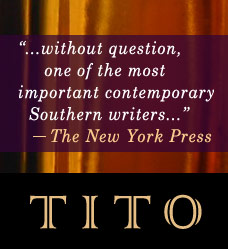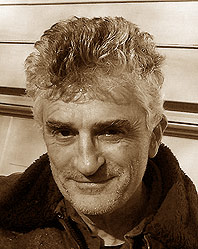INSANITY AS THE NEW NORM - review of The Node
Conservative Heritage Times February 20th 2012
Insanity as the New Norm: A Review of Tito Perdue’s The Node
HarrisonBergeron2
Posted under BookLog & Culture & Survival of the West
In the world of the near future Tito Perdue creates in The Node, there is much the reader will recognize, but little that makes sense. And that’s the point.
The environment is wrecked. Sulfide clouds darken the skies. Older people recall a time when one could find water “free of anti-depressants.” There is a powerful government, but no stability, no social order, and the economy, what’s left of it, is perpetually on the brink of collapse. The Node vividly illustrates the seeming paradox of totalitarian anarchy.
In the territory once known as America, the population has grouped itself into warring ethnic and religious conclaves. Booby-trapped cars, corpses left hanging from cell phone towers, and gang attacks have become commonplace. One group, however, is steadily losing power and property, thanks to the government’s diversity initiatives, and that’s white people, now known as Cauks.
The story begins when the unnamed main character – referred to as “our boy,” “our man,” and, tellingly, “our pilgrim” – can no longer obtain propane for heat. He leaves his farm and sets out for the ruined city, where he hopes to find a sanctuary.
“Our man” offers much to the Cauk commune he joins, including books, a .357 with 200 rounds, and real money – 204 yuan. He proves himself to be such a valuable asset to the group that he is entrusted to take some fellow members out into the country to establish another compound for Cauks, with the ultimate and audacious goal of reclaiming enough territory to establish a resurgent Cauk nation.
The Node is an absurdist novel about an absurd world, where the illogical and fantastic have become ho-hum, and political correctness is the unquestioned standard of the good. Peering through a telescope one night, the protagonist spies a newly-discovered heavenly body named “MLK,” a name it shares with almost all new construction. Perdue displays a wicked sense of humor that lashes modern-day culture. I laughed out loud at a nightmarish cityscape where street whores tried to attract clients by dressing “like high school girls.” Consumerism rules in this world. At one point, “our boy” is acknowledged as a worthy leader because he owns the latest model “escrubilator,” an electronic Swiss army knife which is the most prized of possessions in Perdue’s world.
The central question Perdue poses is blunt and disturbing: Can people reclaim their heritage when they’ve swallowed whole the belief system of those who seek to destroy them? One running gag is how everyone agrees that diversity benefits the economy, though diversity is the law of the land, and the economy is a disaster. When someone suggests going to “Alabama,” the response is, “All those racists?” And no one, including “our boy,” thinks stealing is wrong.
Has “our boy” undertaken a hopeless mission? Is it futile to imagine that a degraded people can rise again?
The author does not provide neat answers to these questions. However, he does affirm that certain standards once existed, that there were once men who lived and fought by a code that could not – and would not – coexist with the world described in The Node:
“This modern age! It prefers the feminine virtues, the easy ones, the ones that can be exercised while sitting on a sofa in a darkened room – compassion, diversity, tolerance, empathy. But us, we aspire to the hard virtues, the ones that hurt – courage, integrity, stamina, and will.”
| | | | | |
2 Comments »
2 Responses to “Insanity as the New Norm: A Review of Tito Perdue’s The Node”
roho on 20 Feb 2012 at 3:07 pm #
HB2……..Sounds interesting.
HarrisonBergeron2 on 20 Feb 2012 at 3:33 pm #
roho,
It is, absolutely. Most fiction these days is rigidly leftist and globalist. We conservatives need to support our own, not just in politics, but in the arts as well.
Besides – it’s a great read.
Insanity as the New Norm: A Review of Tito Perdue’s The Node
HarrisonBergeron2
Posted under BookLog & Culture & Survival of the West
In the world of the near future Tito Perdue creates in The Node, there is much the reader will recognize, but little that makes sense. And that’s the point.
The environment is wrecked. Sulfide clouds darken the skies. Older people recall a time when one could find water “free of anti-depressants.” There is a powerful government, but no stability, no social order, and the economy, what’s left of it, is perpetually on the brink of collapse. The Node vividly illustrates the seeming paradox of totalitarian anarchy.
In the territory once known as America, the population has grouped itself into warring ethnic and religious conclaves. Booby-trapped cars, corpses left hanging from cell phone towers, and gang attacks have become commonplace. One group, however, is steadily losing power and property, thanks to the government’s diversity initiatives, and that’s white people, now known as Cauks.
The story begins when the unnamed main character – referred to as “our boy,” “our man,” and, tellingly, “our pilgrim” – can no longer obtain propane for heat. He leaves his farm and sets out for the ruined city, where he hopes to find a sanctuary.
“Our man” offers much to the Cauk commune he joins, including books, a .357 with 200 rounds, and real money – 204 yuan. He proves himself to be such a valuable asset to the group that he is entrusted to take some fellow members out into the country to establish another compound for Cauks, with the ultimate and audacious goal of reclaiming enough territory to establish a resurgent Cauk nation.
The Node is an absurdist novel about an absurd world, where the illogical and fantastic have become ho-hum, and political correctness is the unquestioned standard of the good. Peering through a telescope one night, the protagonist spies a newly-discovered heavenly body named “MLK,” a name it shares with almost all new construction. Perdue displays a wicked sense of humor that lashes modern-day culture. I laughed out loud at a nightmarish cityscape where street whores tried to attract clients by dressing “like high school girls.” Consumerism rules in this world. At one point, “our boy” is acknowledged as a worthy leader because he owns the latest model “escrubilator,” an electronic Swiss army knife which is the most prized of possessions in Perdue’s world.
The central question Perdue poses is blunt and disturbing: Can people reclaim their heritage when they’ve swallowed whole the belief system of those who seek to destroy them? One running gag is how everyone agrees that diversity benefits the economy, though diversity is the law of the land, and the economy is a disaster. When someone suggests going to “Alabama,” the response is, “All those racists?” And no one, including “our boy,” thinks stealing is wrong.
Has “our boy” undertaken a hopeless mission? Is it futile to imagine that a degraded people can rise again?
The author does not provide neat answers to these questions. However, he does affirm that certain standards once existed, that there were once men who lived and fought by a code that could not – and would not – coexist with the world described in The Node:
“This modern age! It prefers the feminine virtues, the easy ones, the ones that can be exercised while sitting on a sofa in a darkened room – compassion, diversity, tolerance, empathy. But us, we aspire to the hard virtues, the ones that hurt – courage, integrity, stamina, and will.”
| | | | | |
2 Comments »
2 Responses to “Insanity as the New Norm: A Review of Tito Perdue’s The Node”
roho on 20 Feb 2012 at 3:07 pm #
HB2……..Sounds interesting.
HarrisonBergeron2 on 20 Feb 2012 at 3:33 pm #
roho,
It is, absolutely. Most fiction these days is rigidly leftist and globalist. We conservatives need to support our own, not just in politics, but in the arts as well.
Besides – it’s a great read.








